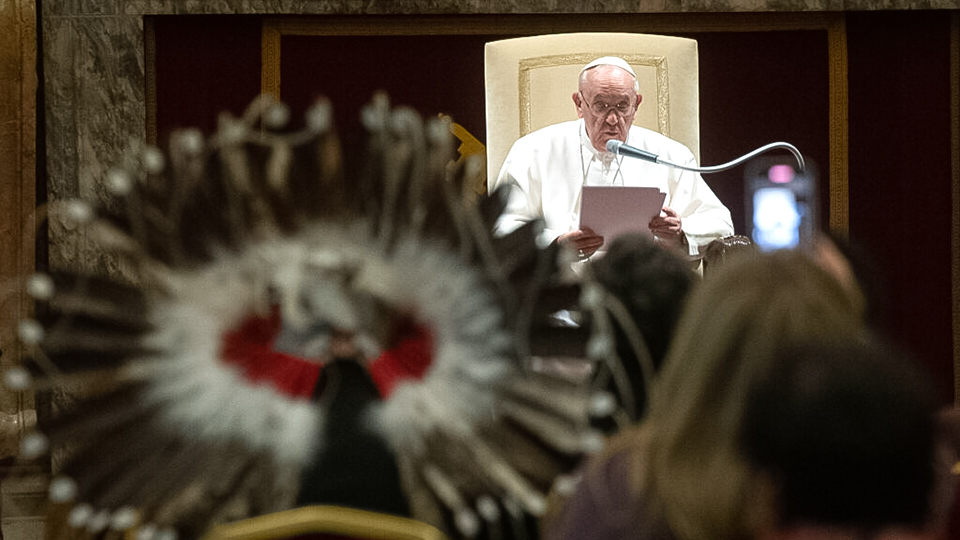

Church defends Indigenous peoples: "Doctrine of Discovery" was never Catholic
Salt + Light Media
Thursday, March 30, 2023

On March 23, 2023, the Dicastery for Communication released this announcement on the Joint Statement of the Dicasteries for Culture and Education and for Promoting Integral Human Development on the “Doctrine of Discovery.”
Read the full text of their press release here:
A “Joint Statement” from the Dicastery for Culture and the Dicastery for Integral Human Development acknowledges that “many Christians have committed evil acts against Indigenous peoples.” Papal bulls from the fifteenth century that granted the goods of aboriginal peoples to sovereign colonizers are political documents, instrumentalized for immoral acts. Already in 1537, Pope Paul III solemnly declared that Indigenous peoples should not be enslaved or robbed of their possessions.
Vatican News - Thanks to dialogue with Indigenous peoples, “the Church has acquired a greater awareness of their sufferings, past and present, due to the expropriation of their lands … as well as the policies of forced assimilation, promoted by the governmental authorities of the time, intended to eliminate their Indigenous cultures,” according to a “Joint Statement” issued by the Dicastery for Culture and Education and the Dicastery for Promoting Integral Human Development, and published on Thursday.
The document states that the “Doctrine of Discovery” – a theory that served to justify the expropriation by sovereign colonizers of Indigenous lands from their rightful owners – “is not a part of the teaching of the Catholic Church.” It further affirms that the papal bulls that granted such “rights” to colonizing sovereigns have never been a part of the Church’s magisterium.
This important text, coming eight months after Pope Francis' penitential journey to Canada, clearly reaffirms the Catholic Church's rejection of the colonising mentality. “In the course of history,” the document recalls, “the Popes have condemned acts of violence, oppression, social injustice and slavery, including those committed against Indigenous peoples.” It also notes the numerous examples of bishops, priests, women and men religious and lay faithful who gave their lives in defense of the dignity of those peoples.” At the same time, it acknowledges that “many Christians have committed evil acts against Indigenous peoples for which recent Popes have asked forgiveness on numerous occasions.”
Regarding the so-called “Doctrine of Discovery," the Statement explains: “The legal concept of ‘discovery’ was debated by colonial powers from the sixteenth century onward and found particular expression in the nineteenth century jurisprudence of courts in several countries, according to which the discovery of lands by settlers granted an exclusive right to extinguish, either by purchase or conquest, the title to or possession of those lands by Indigenous peoples.”
According to some scholars, this “doctrine” found its basis in several papal documents, specifically two bulls of Nicholas V, Dum diversas (1452) and Romanus Pontifex (1455); and Alexander VI’s bull Inter caetera (1493). These are legal acts by which these two Pontiffs authorised the Portuguese and Spanish sovereigns to seize property in colonised lands by subjugating the original populations.
“Historical research clearly demonstrates that the papal documents in question, written in a specific historical period and linked to political questions, have never been considered expressions of the Catholic faith,” the Statement declares. Nonetheless, “the Church acknowledges that these papal bulls did not adequately reflect the equal dignity and rights of Indigenous peoples.” The Statement goes on to say that “ It adds that “the contents of these documents were manipulated for political purposes by competing colonial powers in order to justify immoral acts against Indigenous peoples that were carried out, at times, without opposition from ecclesiastical authorities.” The two Dicasteries therefore affirm, “It is only just to recognize these errors, acknowledge the terrible effects of the assimilation policies and the pain experienced by Indigenous peoples, and ask for pardon.”
The Statement then quotes the words of Pope Francis: “Never again can the Christian community allow itself to be infected by the idea that one culture is superior to others, or that it is legitimate to employ ways of coercing others.” It continues, “In no uncertain terms, the Church’s Magisterium upholds the respect due to every human being,” and concludes, “The Catholic Church therefore repudiates those concepts that fail to recognize the inherent human rights of Indigenous peoples, including what has become known as the legal and political ‘doctrine of discovery’.”
The Statement recalls the “numerous and repeated” declarations of the Church and the Popes in favour of the rights of Indigenous peoples, beginning with the 1537 bull Sublimis Deus of Paul III, which solemnly declared that Indigenous peoples should "are by no means to be deprived of their liberty or the possession of their property, even though they be outside the Christian faith; and that they may and should, freely and legitimately, enjoy their liberty and possession of their property; nor should they be in any way enslaved; should the contrary happen, it shall be null and have no effect.”
Concluding, the Statement notes that, more recently, “the Church’s solidarity with Indigenous peoples has given rise to the Holy See’s strong support for the principles contained in the United Nations Declaration on the Rights of Indigenous Peoples.” It adds, “the implementation of those principles would improve the living conditions and help protect the rights of Indigenous peoples as well as facilitate their development in a way that respects their identity, language and culture.”
Text courtesy of the Dicastery for Communication.
Related Articles:
>>













